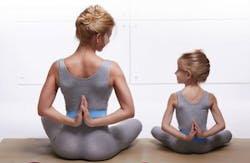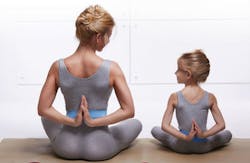Are you taking care of yourself? Correct body positions will add years to your dental career
By Jannette Whisenhunt, RDH, BS, MEd, PhD
As dental hygienists, we help people with their oral care all day long. We sit in crazy ways and bend and stoop all day without thinking that we might be harming our bodies. When we go home, our shoulders ache and our backs are kinked, but we keep on going day after day. This may sound like our normal day, and we just put up with it and don't think it will bother us. Five or 10 years later, we start having issues with frozen shoulders, headaches, and carpal tunnel issues, and then we start thinking about taking care of ourselves. The damage is done!
I know many hygienists in their 40s and 50s who have had to stop working or drastically cut back their hours because of health issues caused by incorrect posture and movements. Sad to say, but we did it to ourselves. Today's dental hygiene curriculum includes ergonomics, but that was not the case for many of us who went to school in the 1970s, 1980s, and early 1990s. Ergonomics was nonexistent! We sat however was comfortable at the time. We were taught how to use our mirrors, but not how to position the whole body. Now we know that not practicing good posture and movements will catch up with us if we don't take care of ourselves. If you want to have a long and healthy career as a dental hygienist, I urge you to pay attention to your body aches and do something about it now before too much damage is done.
To help you get into the correct position, I will review a few of the main points of proper ergonomics. But remember, if you have a bad habit of sitting "any way you can," this will be a huge learning curve for you. When you try to start a new habit, it takes time to stop the bad habit. Give yourself some time to change, and don't try to do it all at once or you'll become discouraged and go back to your old ways. It will feel strange to you, but you can do it, and the rewards will pay off through a much less stressed back and shoulders.
Get the equipment you need to help you sit correctly
Many people wait until the dentist will pay for these items, but since you'll be the one to benefit, I think you need to be the one to take care of yourself! Go ahead and buy the equipment yourself, and you'll be so glad you did. You can always ask your boss if he or she will contribute, but if the answer is no, then don't let that keep you from buying it anyway.
- A pair of loupes is extremely beneficial and will help you see better and sit in the correct position. There are many great loupes out there, so find one that works for you. They even have headlights now.
- There are several operator stools to choose from that will help your back and shoulders. There are some with arm rests, saddle seats that tilt, and torso supports. If you get a chance to go to a district meeting and visit the vendor booths, you can try them out at the show, or you can look online at their websites.
- When your instruments are sharp, you work more efficiently. Order the instruments that have harder metals that don't have to be sharpened as often. There are several on the market now. If they hold their edges longer, less sharpening time is needed.
Exercise, core strengthening, and stress reduction
- Exercising every week will help in many respects, and will help you maintain your muscle strength and weight. Do something you enjoy and do it often! If you love yoga, it provides fantastic core exercises, but if you like to get outside and just walk, then do that. Lifting some free weights a couple of times a week is great exercise. The main thing is to do some form of exercise regularly.
- Stress reduction comes in various forms, depending on the person. Deep breathing and meditation may not be your thing, but it is a good way to calm yourself. Regular deep breathing will clear your thinking. Stopping and counting to 10 is not as silly as it may seem, and if you think before you speak or react, then you may avert some added stress in your life.
- Regular massages are heavenly! Find a good licensed massage therapist and make an appointment for once a month. Therapists can work out those kinked muscles and keep them from getting worse. Many can give you exercises to help you improve whatever ails you.
Ergonomics basics
- Start with your feet flat on the floor so your spine can support your torso. If you are using a traditional chair, make sure to use the back to help the support the lumbar region. Saddle stools allow clinicians to sit up higher and closer to the patient and reduce the need to lean forward. I used to have a bad habit of sitting with my feet back under my stool and my feet turned on my toes. I've also seen hygienists sit with their legs crossed, which is not good!
- Your arms from your elbows to your wrists should be parallel to the floor when you're working, and even in height with the mouth. This means your patient's head needs to be low enough to keep your arms down at your sides when you're working. Pulling your arms up to reach the mouth causes a lot of stress in the shoulders and neck.
- Use your mirror! Have your patients turn their heads right and left and up and down so that you can see. Most of us do not do this; we are the ones leaning over in order to see. Patients are in the chair for 45 minutes to an hour twice a year. We sit there for eight hours a day! They are the ones who need to move in awkward positions for a few minutes, not us.
- Keep your back straight and your torso in line. Do not twist in the chair.
I hope these basics help you take better care of yourself. If you have a physical ailment related to your career, you are not alone. You need to do something to stop the damage and help you heal. Many habits are not good ones, so give yourself some time to work on changing them. Taking on two or three of these suggestions at a time will help you; then add more good habits as you can. Take care of yourself. No one else will do it for you! Happy scaling! RDH
Jannette Whisenhunt, RDH, BS, MEd, PhD, is the Department Chair of Dental Education at Forsyth Technical Community College in Winston-Salem, N.C. Dr. Whisenhunt has taught since 1987 in the dental hygiene and dental assisting curricula. She has a love for students and served as the state student advisor for nine years and has won the student Advisor of the Year award from ADHA in the past. Her teaching interests are in oral cancer, ethics, infection control, emergencies and orofacial anatomy. Dr. Whisenhunt also has a small continuing education business where she provides CE courses for dental practices and local associations. She can be reached at [email protected].

